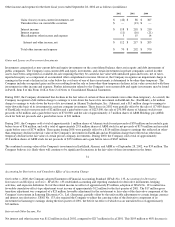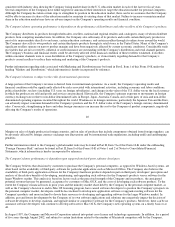Apple 2002 Annual Report Download - page 34
Download and view the complete annual report
Please find page 34 of the 2002 Apple annual report below. You can navigate through the pages in the report by either clicking on the pages listed below, or by using the keyword search tool below to find specific information within the annual report.
Microsoft was required to make versions of its Microsoft Office and Internet Explorer products for the Mac OS. Although Microsoft has
released Microsoft Office and Internet Explorer for Mac OS X, Microsoft is not obligated to produce future versions of its products subsequent
to August 2002. While the Company believes its relationship with Microsoft has been and will continue to be beneficial to the Company and to
its efforts to increase the installed base for the Mac OS, the Company does compete directly with Microsoft in a number of key areas.
Accordingly, Microsoft's interest in producing application software for the Mac OS following expiration of the agreements may be influenced
by Microsoft's perception of its interests as the vendor of the Windows operating system. Discontinuance of Microsoft Office and other
Microsoft products for the Macintosh platform would have an adverse effect on the Company's net sales and results of operations.
The Company's business relies on access to patents and intellectual property obtained from third parties, and the Company's future results
could be adversely affected if it is alleged or found to have infringed on the intellectual property rights of others.
Many of the Company's products are designed to include intellectual property obtained from third parties. While it may be necessary in the
future to seek or renew licenses relating to various aspects of its products and business methods, the Company believes that based upon past
experience and industry practice, such licenses generally could be obtained on commercially reasonable terms. However, there can be no
assurance that the necessary licenses would be available or available on acceptable terms.
41
Because of technological changes in the computer industry, current extensive patent coverage, and the rapid rate of issuance of new patents, it
is possible certain components of the Company's products and business methods may unknowingly infringe existing patents of others. The
Company has from time to time been notified that it may be infringing certain patents or other intellectual property rights of others. Responding
to such claims, regardless of their merit, can be time consuming, result in significant expenses, and cause the diversion of management and
technical personnel. Several pending claims are in various stages of evaluation. The Company may consider the desirability of entering into
licensing agreements in certain of these cases. However, no assurance can be given that such licenses can be obtained on acceptable terms or
that litigation will not occur. In the event there is a temporary or permanent injunction entered prohibiting the Company from marketing or
selling certain of its products or a successful claim of infringement against the Company requiring it to pay royalties to a third-party, the
Company's future operating results and financial condition could be adversely effected. Information regarding claims and potential litigation
involving the Company related to alleged patent infringement and other matters is set forth in Part I, Item 3 of this Form 10-K. In the opinion
of management, the Company does not have a potential liability for damages or royalties from any current legal proceedings or claims related
to the infringement of patent or other intellectual property rights of others that would have a material adverse effect on its results of operations,
or financial condition. However, the results of such legal proceedings cannot be predicted with certainty. Should the Company fail to prevail in
any of the matters related to infringement of patent or other intellectual property rights of others described in Part I, Item 3 of this Form 10-K
or should several of these matters be resolved against the Company in the same reporting period, the operating results of a particular reporting
period could be materially adversely affected.
The Company expects its quarterly revenues and operating results to fluctuate for a variety of reasons.
The Company's profit margins vary among its products, its geographic markets, and its distribution channels. As a result, the overall
profitability of the Company in any given period will depend, in part, on the product, geographic, and channel mix reflected in that period's net
sales.
The typical concentration of net sales in the third month of the Company's fiscal quarters can adversely affect the Company's business and
operating results.
The Company generally sells more products during the third month of each quarter than it does during either of the first two months, a pattern
typical in the personal computer industry. This sales pattern can produce pressure on the Company's internal infrastructure during the third
month of a quarter and may adversely impact the Company's ability to predict its financial results accurately. Developments late in a quarter,
such as lower-than-
anticipated demand for the Company's products, an internal systems failure, or failure of one of the Company's key logistics
or components suppliers, can have significant adverse impacts on the Company and its results of operations and financial condition.
The Company's success depends largely on its ability to attract and retain key personnel.
Much of the future success of the Company depends on the continued service and availability of skilled personnel, including those in technical,
marketing and staff positions. Experienced personnel in the information technology industry are in high demand and competition for their
talents is intense, especially in the Silicon Valley, where the majority of the Company's employees are located. There can be no assurance that
the Company will be able to successfully attract and retain the key personnel it needs. Additionally, volatility or a lack of positive performance
in the Company's stock price may adversely affect its ability to retain key employees. As of September 28, 2002, a substantial majority of the
Company's outstanding employee stock options were out-of-the-money.
The Company is subject to risks associated with the availability and cost of insurance.
The Company has observed rapidly changing conditions in the insurance markets relating to nearly all areas of traditional corporate insurance.
























